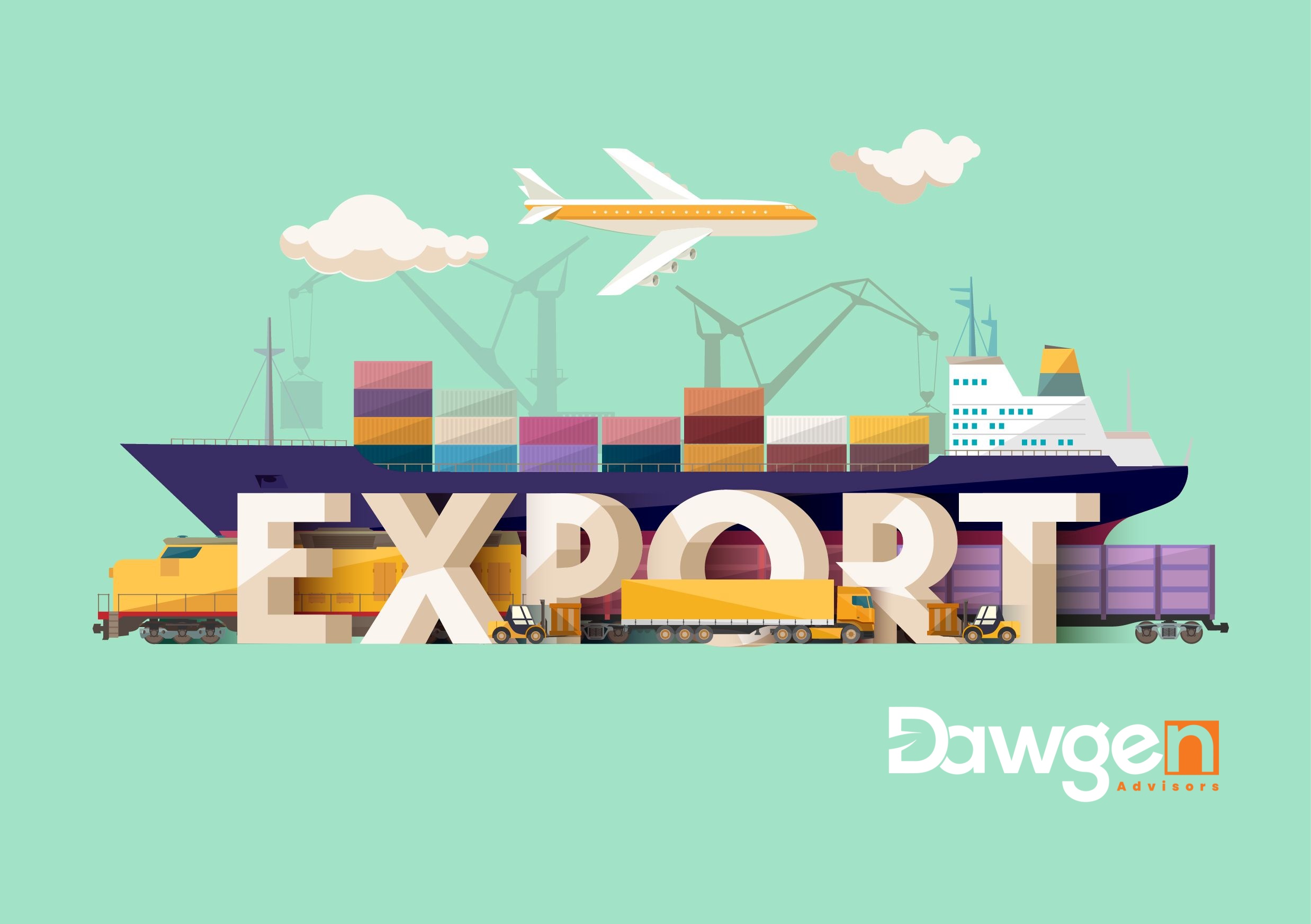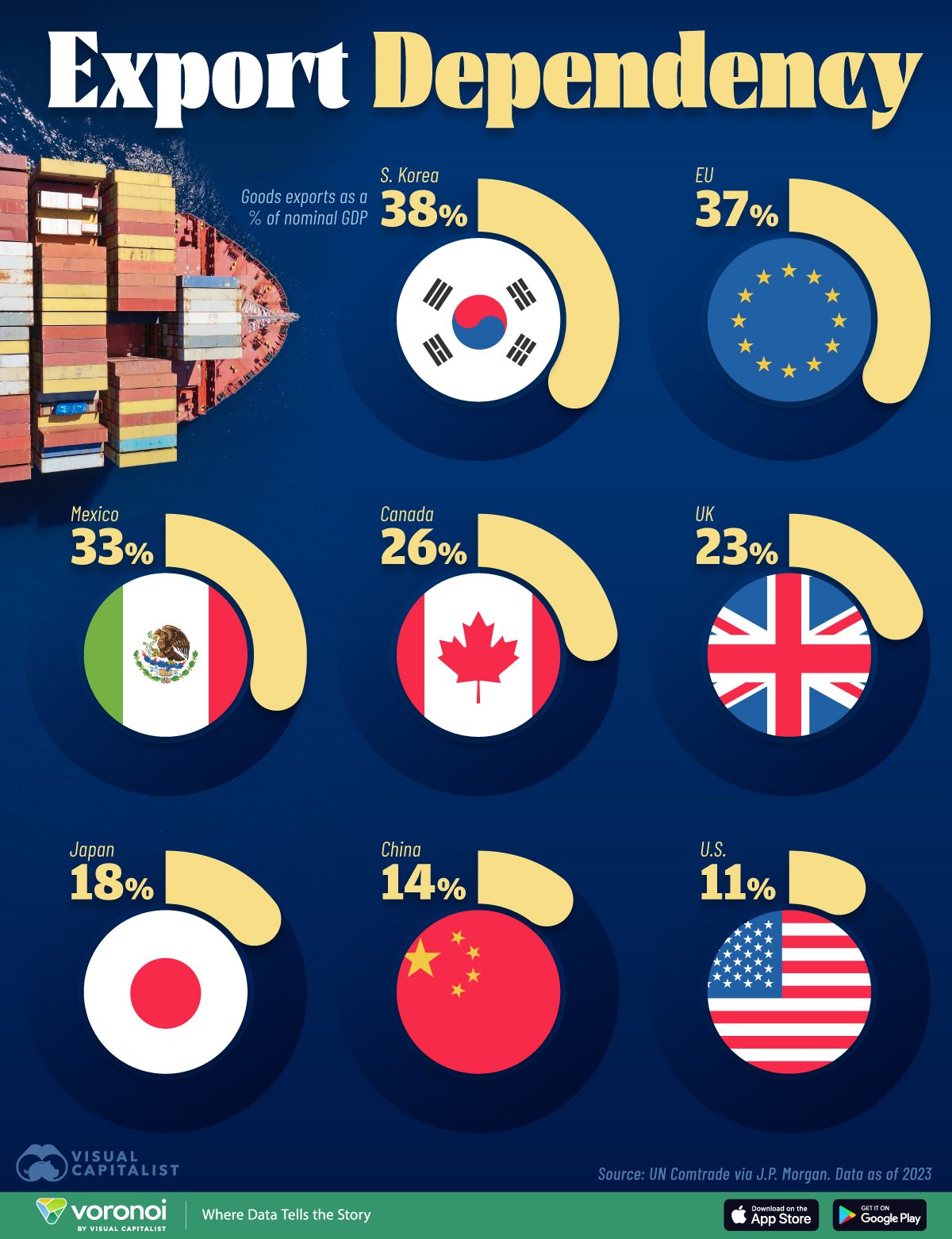
In an increasingly interconnected global economy, the structure of a nation’s GDP reveals much about its exposure to international forces. One of the most critical metrics in this context is export dependency—the ratio of a country’s exports to its Gross Domestic Product (GDP). High export dependency often indicates an economy’s reliance on global markets to drive growth, while low dependency highlights the strength of domestic demand. However, this dynamic becomes more complex when tariffs and trade policies come into play.
At Dawgen Global, we explore how this relationship shapes strategic decisions for governments, industries, and investors alike—especially in a volatile geopolitical environment where tariffs can disrupt trade flows, reconfigure supply chains, and redefine national priorities.
Understanding Export Dependency: A Global Snapshot
Recent data from Visual Capitalist provides a compelling look at how major economies depend on exports:
-
South Korea (38%) and European Union (37%) sit at the high end of the spectrum, driven by advanced manufacturing and intra-regional trade.
-
Mexico (33%) and Canada (26%) reveal a North American economic symbiosis, heavily reliant on trade with the United States.
-
China (14%) and United States (11%)—the world’s two largest economies—exhibit relatively low export-to-GDP ratios, owing to the depth and scale of their domestic markets.
While high export dependency can accelerate growth in emerging economies and export-oriented sectors, it also introduces a layer of vulnerability—particularly in times of global disruption.

Tariffs: A Double-Edged Sword
What Are Tariffs?
Tariffs are taxes or duties imposed by governments on imported goods. They serve multiple purposes:
-
Protect domestic industries from foreign competition,
-
Generate revenue,
-
Serve as bargaining chips in trade negotiations.
However, the introduction or escalation of tariffs can have significant consequences—especially for export-dependent economies.
Implications of Tariffs for Export-Oriented Nations
-
Demand Disruption
Countries that rely on exports for growth may face immediate slowdowns when tariffs reduce demand for their goods. For instance, when the U.S. imposed tariffs on Chinese goods, China’s export sector felt the shockwaves—affecting not only producers but also suppliers across the Asia-Pacific region. -
Supply Chain Recalibration
Tariffs often force companies to reconfigure global supply chains. Export-heavy nations such as Germany, South Korea, and Japan have had to adapt their logistics and sourcing strategies to remain competitive in the face of rising costs. -
Investment Uncertainty
For export-dependent economies, tariff risks can reduce foreign direct investment (FDI) as multinationals hesitate to invest in regions exposed to trade frictions. This can slow innovation, infrastructure development, and industrial expansion. -
Competitiveness Challenges
Tariffs can erode the price advantage of exports, especially for countries competing on thin margins. This is particularly critical for nations like Mexico or Vietnam, which compete in price-sensitive markets such as apparel and electronics.
Strategic Considerations for Export-Dependent Economies
To mitigate risks, policymakers and corporate leaders must think proactively:
1. Market Diversification
Exporters must avoid overdependence on a single country or region. For instance, Latin American countries increasingly seek access to European and Asian markets to offset dependency on the U.S.
2. Trade Agreements and Alliances
Participation in multilateral trade pacts like the Comprehensive and Progressive Agreement for Trans-Pacific Partnership (CPTPP) or the African Continental Free Trade Area (AfCFTA) can offer tariff-free access and improve negotiation leverage.
3. Domestic Market Development
Encouraging internal demand—through infrastructure investment, financial inclusion, and consumption-driven growth—can reduce the economic shock of falling export revenues.
4. Value Chain Integration
Instead of exporting raw materials or low-margin goods, countries can focus on value-added production—for example, processing cocoa into chocolate rather than exporting raw beans. This boosts both margins and resilience.
A Dawgen Global Perspective: The Role of Professional Advisory
At Dawgen Global, we understand that the evolving dynamics of global trade present both opportunities and challenges. In today’s interconnected world, businesses and governments must skillfully balance the benefits of international integration with the need to protect economic sovereignty and build long-term resilience. This delicate equilibrium calls for insightful analysis, strategic foresight, and informed decision-making—areas where Dawgen Global excels.
Our Integrated Advisory Framework
Our multidisciplinary team of experts—including economists, legal advisors, trade consultants, financial analysts, and supply chain specialists—provides tailored advisory solutions that address the full spectrum of international trade complexities. Here’s how we support stakeholders in navigating the export dependency landscape and responding to tariff-related pressures:
1. Trade Policy Evaluation and Impact Analysis
We assist policymakers and industry leaders in interpreting and responding to new or changing trade policies. This includes:
-
Assessing how regional and global agreements (e.g., CARICOM, AfCFTA, CPTPP) impact national interests and sectoral competitiveness.
-
Evaluating the downstream effects of tariff measures on GDP, employment, inflation, and consumer prices.
-
Recommending policy adjustments to optimize trade gains while mitigating external risks.
2. Tariff Optimization Strategies and Legal Compliance
We guide exporters and importers through:
-
Structuring supply and sales agreements to minimize exposure to tariff costs.
-
Navigating customs classifications and tariff codes to ensure accurate duty assessments.
-
Implementing legal strategies to benefit from trade preference programs (e.g., duty-free access under GSP, EPA agreements).
3. Supply Chain Risk Assessments
Modern supply chains are global and intricate. Dawgen Global helps organizations:
-
Identify potential tariff-triggered bottlenecks or delays.
-
Evaluate alternative sourcing and manufacturing locations.
-
Develop resilient logistics networks and inventory strategies to buffer against geopolitical uncertainty.
4. Market Entry and Diversification Strategies
Overdependence on a single export destination can be risky. We support clients in:
-
Analyzing emerging markets for growth opportunities.
-
Conducting due diligence on new trading partners.
-
Structuring go-to-market strategies that comply with local regulations and tax regimes.
5. Domestic Industrial Development Planning
We believe that long-term competitiveness requires more than external market access—it demands internal capacity building. Dawgen Global works with public and private sector entities to:
-
Formulate industrial policies that promote value-added production.
-
Encourage investment in local innovation, skills development, and SME competitiveness.
-
Align export strategies with national development priorities and sustainability goals.
A Trusted Advisor in a Shifting Trade Landscape
In an era marked by shifting alliances, trade wars, digitalization, and climate-conscious policies, Dawgen Global offers more than technical expertise—we offer strategic clarity. We help our clients reimagine their economic trajectories with agility, creativity, and resilience at the forefront.
Whether your goal is to optimize exports, safeguard domestic industry, or pivot in the face of new tariff regimes, Dawgen Global is your trusted partner in navigating the complexities of global commerce.
Conclusion: Trade Smart, Trade Strategically
Export dependency is not inherently negative—it reflects a nation’s integration into the global value chain and its productive competitiveness. However, when the winds of trade policy shift—particularly with the application of tariffs—overdependence can expose economies and companies to significant vulnerabilities.
As the world moves further into 2025, the winners will not be those who rely solely on existing markets or legacy models, but those who adapt, diversify, and make informed, forward-looking decisions.
At Dawgen Global, we are committed to helping our clients do exactly that—make smarter and more effective decisions that drive sustainable growth, mitigate risks, and unlock new possibilities.
Next Step!
“Embrace BIG FIRM capabilities without the big firm price at Dawgen Global, your committed partner in carving a pathway to continual progress in the vibrant Caribbean region. Our integrated, multidisciplinary approach is finely tuned to address the unique intricacies and lucrative prospects that the region has to offer. Offering a rich array of services, including audit, accounting, tax, IT, HR, risk management, and more, we facilitate smarter and more effective decisions that set the stage for unprecedented triumphs. Let’s collaborate and craft a future where every decision is a steppingstone to greater success. Reach out to explore a partnership that promises not just growth but a future beaming with opportunities and achievements.
✉️ Email: [email protected] 🌐 Visit: Dawgen Global Website
📞 Caribbean Office: +1876-6655926 / 876-9293670/876-9265210 📲 WhatsApp Global: +1 876 5544445
📞 USA Office: 855-354-2447
Join hands with Dawgen Global. Together, let’s venture into a future brimming with opportunities and achievements

